On 17 September 2025, Taipei hosted an event that crossed both geographic and industry boundaries. Organised by the British Chamber of Commerce in Taipei (BCCTaipei), the Better Business Awards marked its ninth edition. Over the years, the event has evolved from a celebration of corporate achievement into an important benchmark for Taiwanese companies to align with international standards and reflect on their own development strategies.
At the awards ceremony, senior executives of multinational corporations, industry leaders, entrepreneurs from start-ups and SMEs, renewable energy experts, sustainability advocates, and organisations committed to education, healthcare and social innovation all gathered under one roof. From technology and manufacturing to healthcare, retail and cultural brands, a diverse range of business models and perspectives intersected, presenting a forward-looking vision of how Asian enterprises are responding to global transformation.
The significance of this event lies not only in the remarkable achievements of the finalists and winners but also in the international influence of its organiser. As one of the most prominent platforms bridging Taiwan and the United Kingdom, BCCTaipei works closely with government-level partners, including the British Office Taipei. This partnership ensures that the judging criteria for the Better Business Awards are grounded in international governance standards and global sustainability trends. For participating companies, being shortlisted or winning at this event is not only an honour but also a symbol of international recognition.
In an interview with《The Icons》, Vicki Wu, Executive Director of BCCTaipei, emphasised that the Better Business Awards have never been a competition but a profound dialogue about corporate values. Through this initiative, she hopes companies will reconsider their place in the world and adopt a perspective that goes beyond revenue and scale.
“We are not only seeking successful companies,” Wu said, “but also standing alongside those committed to doing the right thing.”
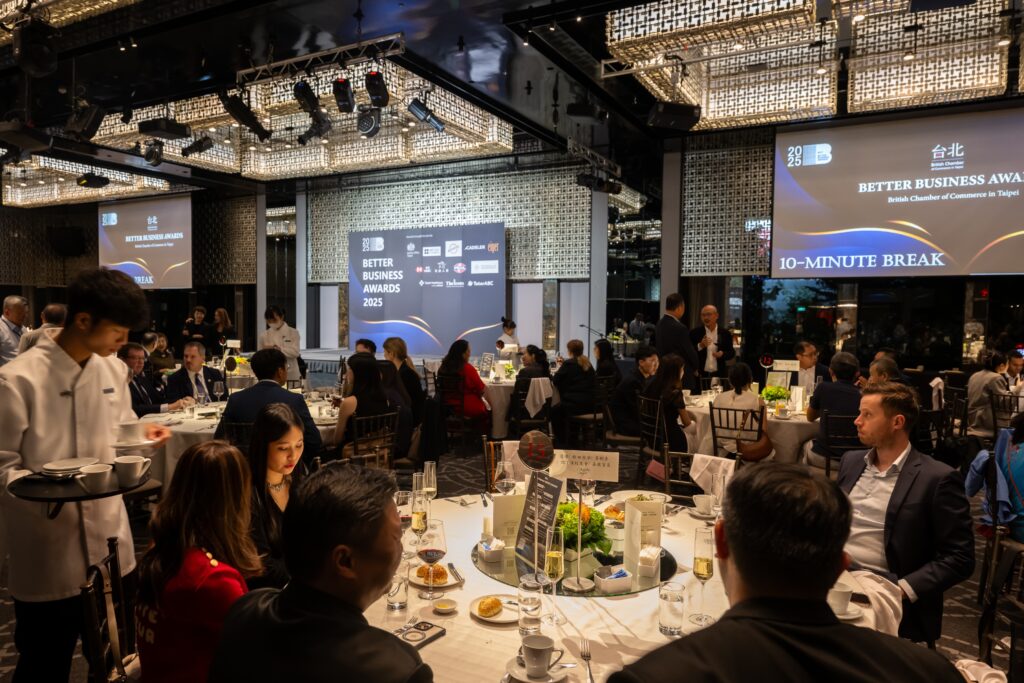
A Connecting Point Between Taiwan and the International Community
To understand why the Better Business Awards hold such strong credibility and international influence in Taiwan, one must first recognise the unique positioning of the British Chamber of Commerce in Taipei (BCCTaipei). Unlike many chambers that primarily serve commercial or member-driven interests, BCCTaipei functions as a non-governmental organisation while maintaining a close partnership with the British Office Taipei. This balance of neutrality and access to global resources makes it a vital bridge connecting policy, industry and international trends.
Many companies initially view the Chamber as merely a networking platform for British businesses in Taiwan, but those who engage more deeply soon realise that BCCTaipei operates as a high-level strategic community. It brings together visionary leaders and globally minded enterprises, facilitating not only business cooperation but also meaningful policy participation, cross-border dialogue and sustainability initiatives.
According to Vicki Wu, BCCTaipei’s Executive Director, the Chamber’s strength lies in its neutrality. Because it is not driven by profit or specific industry interests, companies are willing to share their genuine challenges, allowing the Chamber to cultivate deeper and more meaningful conversations rather than superficial exchanges. Many newcomers assume the Chamber’s value lies in business matchmaking; however, once involved, they discover that its true focus is guiding the direction of industries—discussing where companies, and indeed entire sectors, are headed.
“We are not here to do public relations for anyone,” Wu explained. “We are here to think together about where businesses should go. The Chamber’s value is not about helping companies make more money, but about helping them become more meaningful. If we want to drive change, we cannot just follow the market—we must lead it with values.”
In this spirit, BCCTaipei is not only connecting resources but also shaping a new kind of corporate civilisation. From collaborating with the UK government on sustainability policy to helping companies understand frameworks like the EU Carbon Border Adjustment Mechanism (CBAM) and ESG reporting, and facilitating cross-sector dialogue across education, healthcare and energy, BCCTaipei’s role has long transcended that of a traditional chamber of commerce. It provides Taiwanese companies with a gateway to international engagement while showcasing Taiwan’s maturity and innovation to the world.
“Taiwan should not remain merely a node in the global supply chain,” Wu emphasised. “It should become a voice in defining global value. The Better Business Awards are our way of advancing that vision—ensuring that companies worthy of recognition are not just participating in the market, but actively shaping the future.”
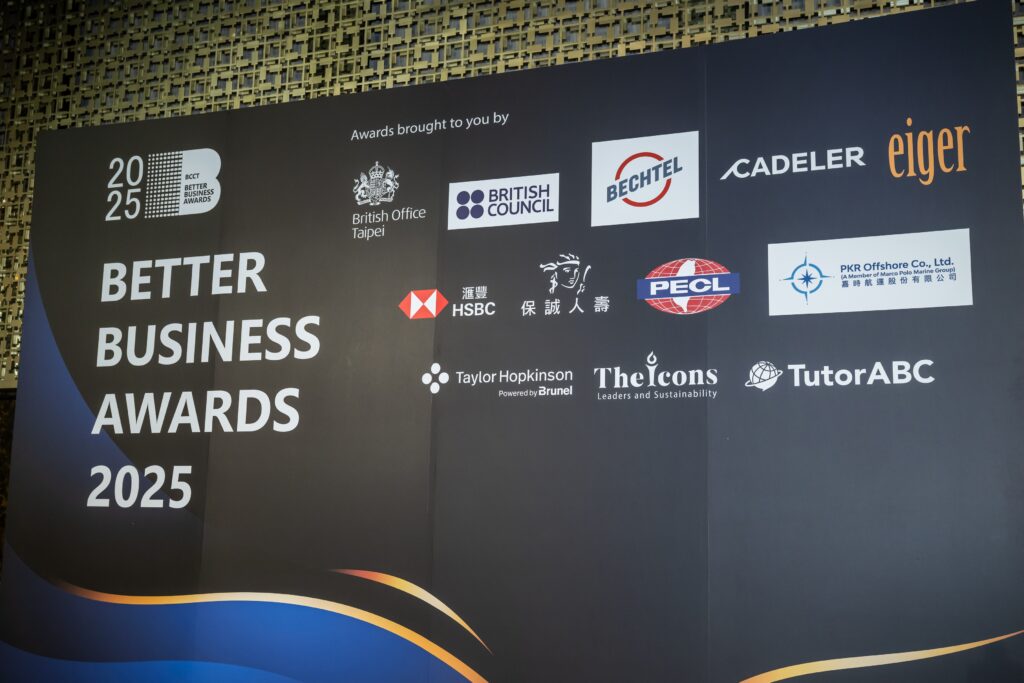
The Awards Are Not the Goal, but a Catalyst for Businesses to Rethink Why They Do What They Do
Since its founding, the Better Business Awards has never been a competition focused on financial data or market share. What makes this award unique is that it does not ask “how much did you earn,” but instead asks “how did you earn it, why do you do it this way, and are you willing to take responsibility for the long term?” This perspective sets it apart from conventional business awards from the very beginning.
According to Vicki Wu, Executive Director of BCCTaipei, as a non-profit organisation, the Chamber itself is not driven by commercial interests. Therefore, when designing the award mechanism, it intentionally removed thresholds related to investment size, market share, or available resources. What she aims to build is a platform of values, where companies of all sizes, stages, and industries—so long as they have clear principles and genuine action—can stand on the same stage and be recognised.
“The spirit of the Better Business Awards lies in whether companies are willing to take one step further for society, not in how many resources they have.” To ensure credibility, each year’s judging panel is composed of industry experts, academics, multinational executives, and sustainability professionals with international backgrounds. They not only assess results but also examine the decision-making process and whether actions are sustainable and replicable. For example, a short-term ESG campaign, no matter how visible, will not be favoured, while an initiative that may still be developing but is embedded in the company’s core strategy will be highly valued.
More importantly, the evaluation process itself becomes a dialogue. Many companies, during their applications, systematically review their sustainability strategies and social impact for the first time—often discovering strengths or values that had never been articulated. Some even realise, through conversations with judges, that they can do more and choose to adjust their direction. As a result, the awards are not merely a competition but a mirror that helps companies see where they truly stand.
“Many companies only realise after applying that they have already done so much meaningful work—they just never organised it before.” The essence of the Better Business Awards, Wu emphasised, is not to single out the best company, but to guide enterprises toward a deeper question: What kind of company do we want to become? What matters most is not the outcome, but whether the process inspires self-awareness and a long-term mindset.
“We hope companies don’t change just to win an award, but become award-worthy through the process of change.” In a fast-changing global market, this approach has made the Better Business Awards one of Taiwan’s most forward-looking and internationally connected business benchmarks. It does not reward superficial figures but recognises genuine growth, determination, and accountability. It does not seek fleeting moments of glory but encourages the steady accumulation of long-term value.
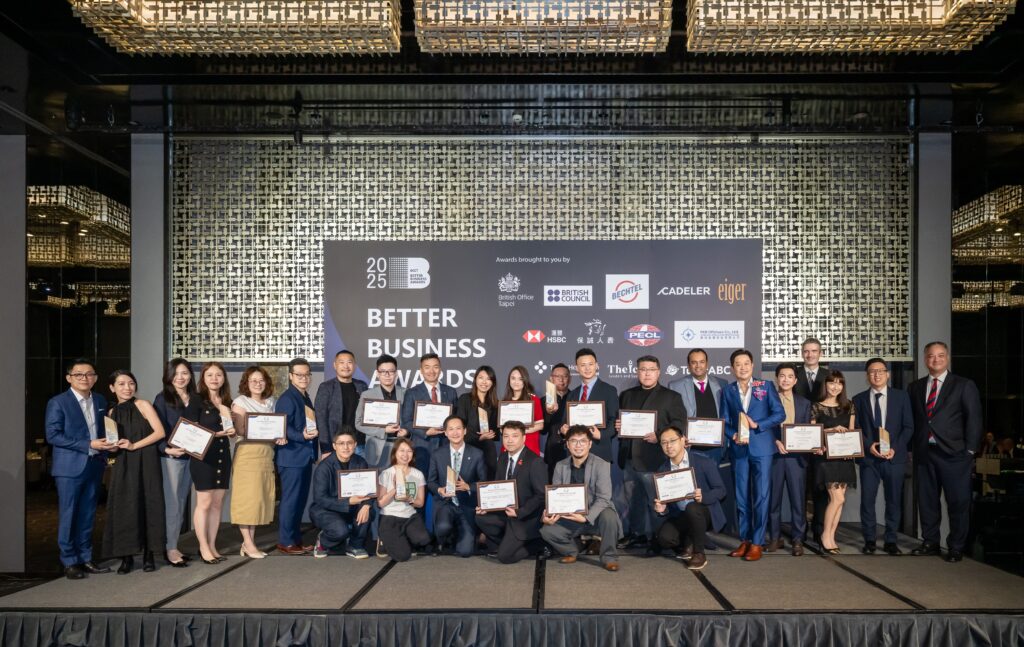
Vicki Wu: Companies Are Beginning to Redefine What Truly Deserves to Come First
Reflecting on the 2025 applicant and finalist list, Vicki Wu observed a critical shift—one that goes beyond year-to-year change and reflects a deeper transformation in how companies prioritise what truly matters.
In previous years, proposals related to diversity made up a significant portion of entries. From gender equality and inclusive workplaces to multicultural team building, many companies actively showcased their organisational values. However, in 2025, the visibility of such topics declined. Some interpreted this as a waning focus on diversity, but the reality is far more nuanced.
As the global political climate shifts—particularly with a more conservative tone in the United States on social issues—multinational companies have become more cautious about taking public stances. Operating across multiple markets means every statement can be magnified, potentially affecting partnerships, investments and brand positioning. As a result, many firms have chosen to uphold their values in quieter, more internal ways.
“Some companies haven’t abandoned diversity; they’re simply implementing it more intelligently and steadily,” Wu explained. While diversity efforts have become more internalised, another issue has rapidly moved to the forefront—sustainability and ESG development.
This change is not a passing trend but the result of policy pressure, supply chain demands and structural shifts in global markets. With the 2050 net-zero target fast approaching and mechanisms such as carbon taxes and border adjustment policies on the horizon, international corporations are demanding higher environmental and governance standards from their partners. These forces are compelling businesses to re-evaluate their operations, integrating sustainability into cost structures, strategies and even product design.
“Sustainability is no longer a slogan—it has become the key to whether a company can continue doing business.” In this year’s submissions, BCCTaipei noted numerous in-depth cases: companies outlining concrete carbon-management plans, building recycling systems, adopting renewable energy, extending product lifecycles and developing platforms that connect upstream and downstream players to drive broader industry change. More importantly, sustainability is no longer treated as a departmental project; it has entered the core of corporate governance, influencing decision-making and organisational culture.
Wu also pointed out that participating companies are now speaking a shared common language. “When businesses shift their mindset from immediate profit to the kind of value they want to leave behind ten years from now, the entire ecosystem begins to change.” Sustainability has become the foundation for long-term resilience, expanding beyond environmental issues into operations, resource allocation and governance. Diversity, while less visible, has been deeply embedded into everyday practices and company culture, forming a quieter yet more authentic driving force within organisations.
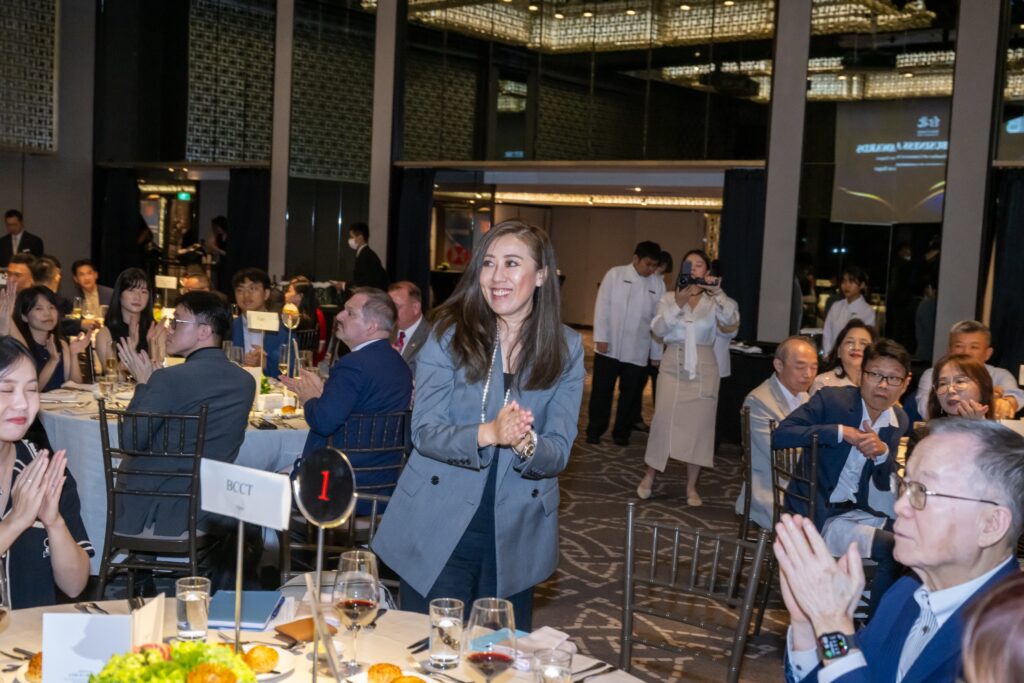
From an Awards Ceremony to a Collective Evolution of Corporate Values
The reason the Better Business Awards has taken root in Taiwan for nine years lies not in its scale or form but in the clarity and rarity of the role it plays. For companies, it serves as a mirror that reflects their true state and position, a stage that amplifies worthy efforts to a global audience, and a driving force that encourages progress, fuels industrial transformation and redefines corporate value.
According to Vicki Wu, Executive Director of BCCTaipei, Taiwanese companies were once seen primarily as part of the global supply chain. Today, however, more businesses are building brands, creating new business models, adopting sustainability strategies and even leading in social impact. The purpose of the Better Business Awards is to bring these forward-looking enterprises to the forefront, allowing them to serve as benchmarks for others and to generate collective progress. “A company’s true competitiveness,” Wu noted, “comes from the values it creates, not from the resources it possesses.”
Looking ahead, BCCTaipei aims to use the Awards and its broader platform to foster greater international exchange and industrial collaboration, enabling Taiwanese enterprises to engage with their UK and global counterparts on equal footing. Together, they will address core issues such as sustainability policy, green supply chains, digital transformation and talent development. At the same time, the Chamber plans to introduce international standards and resources, helping Taiwanese businesses move beyond the role of learners to become active participants, and even contributors to rule-making on the global stage.
Wu emphasised that the Better Business Awards has never regarded the event itself as the destination. Instead, it is part of an ongoing effort to build an ecosystem where companies grow continuously, collaborate meaningfully and rise together. This ecosystem values influence over scale and pursues co-created value rather than one-time visibility.
“The true measure of a company’s stature lies not in its financial figures but in what it leaves behind for society,” Wu said. When businesses engage with social issues, contribute to cultural connection and invest in talent development, what they create transcends business results, it becomes a legacy of enduring value. This is the essence of the Better Business Awards: to pursue longevity, create meaning and drive evolution.
In a rapidly changing market, the leaders are never those with the most resources but those who can adapt, evolve and embrace change. Wu believes that Taiwan possesses this very energy, and BCCTaipei’s mission is to make it visible and elevate it to the global stage.
“The Better Business Awards is not an endpoint but a long-term choice. As more companies take this path, Taiwan will not merely participate in the global landscape, it will help shape the future.”
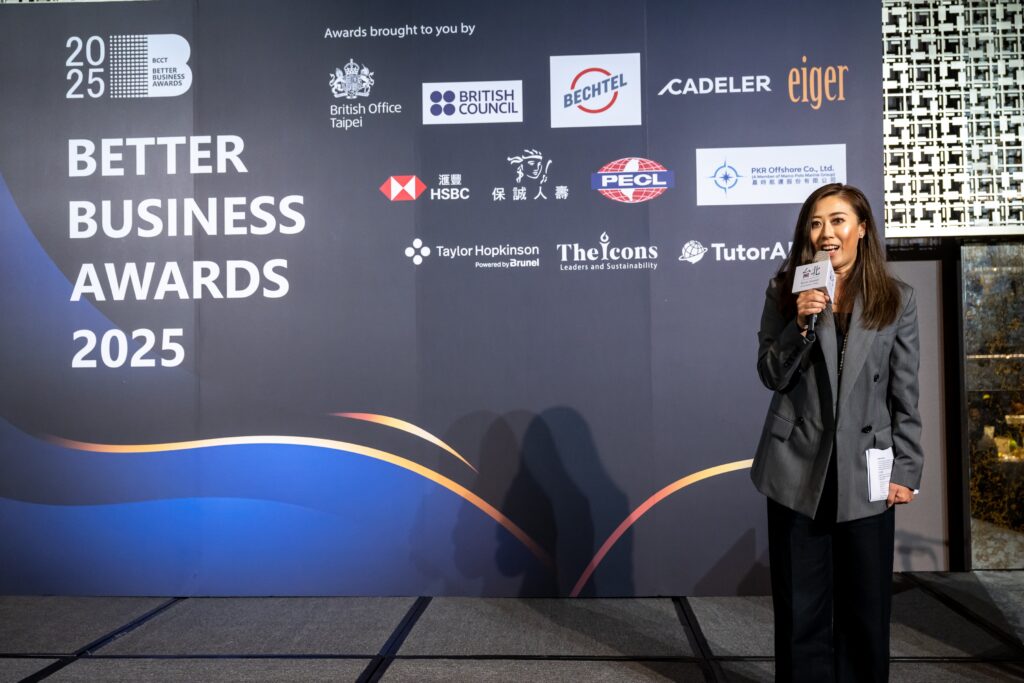
Recommend for you: